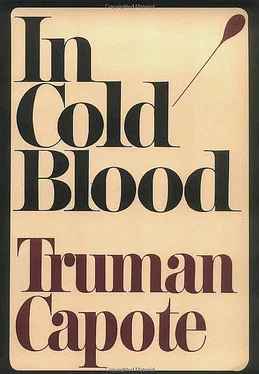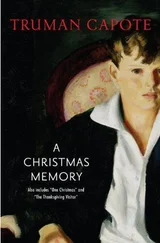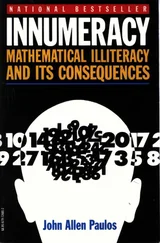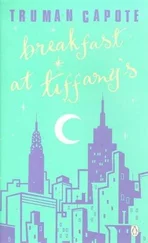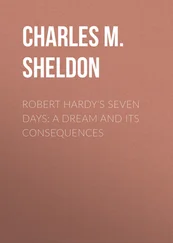Hickock said, “Whoa, now. Hold on here. I’m no goddam killer.”
“The question asked,” Church reminded him, “was whether you’d heard of the Clutter murders.”
“I may have read something,” Hickock said.
“A vicious crime. Vicious. Cowardly.”
“And almost perfect,” Nye said. “But you made two mistakes, Dick. One was, you left a witness. A living witness. Who’ll testify in court. Who’ll stand in the witness box and tell a jury how Richard Hickock and Perry Smith bound and gagged and slaughtered four helpless people.”
Hickock’s face reddened with returning color. “Living witness! There can’t be!”
“Because you thought you’d got rid of everyone?”
“I said whoa! There ain’t anybody can connect me with any goddam murder. Checks. A little petty thievery. But I’m no goddam killer.”
“Then why,” Nye asked hotly, “have you been lying to us?”
“I’ve been telling you the goddam truth.”
“Now and then. Not always. For instance, what about Saturday afternoon, November fourteenth? You say you drove to Fort Scott.”
“Yes.”
“And when you got there you went to the post office.”
“Yes.”
“To obtain the address of Perry Smith’s sister.”
“That’s right.”
Nye rose. He walked around to the rear of Hickock’s chair, and placing his hands on the back of the chair, leaned down as though to whisper in the prisoner’s ear. “Perry Smith has no sister living in Fort Scott,” he said. “He never has had. And on Saturday afternoons the Fort Scott post office happens to be closed.” Then he said, “Think it over, Dick. That’s all for now. We’ll talk to you later.”
After Hickock’s dismissal, Nye and Church crossed the corridor, and looking through the one-way observation window set in the door of the interrogation room, watched the questioning of Perry Smith—a scene visible though not audible. Nye, who was seeing Smith for the first time, was fascinated by his feet—by the fact that his legs were so short that his feet, as small as a child’s, couldn’t quite make the floor. Smith’s head—the stiff Indian hair, the Irish-Indian blending of dark skip and pert, impish features—reminded him of the suspect’s pretty sister, the nice Mrs. Johnson. But this chunky, misshapen child-man was not pretty; the pink end of his tongue darted forth, flickering like the tongue of a lizard. He was smoking a cigarette, and from the evenness of his exhalations Nye deduced that he was still a “virgin”—that is, still uninformed about the real purpose of the interview.
Nye was right. For Dewey and Duntz, patient professionals, had gradually narrowed the prisoner’s life story to the events of the last seven weeks, then reduced those to a concentrated recapitulation of the crucial week-end—Saturday noon to Sunday noon, November 14 to 15. Now, having spent three hours preparing the way, they were not far from coming to the point.
Dewey said, “Perry, let’s review our position. Now, when you received parole, it was on condition that you never return to Kansas.
“The Sunflower State. I cried my eyes out.”
“Feeling that way, why did you go back? You must have had some very strong reason.”
“I told you. To see my sister. To get the money she was holding for me.”
“Oh, yes. The sister you and Hickock tried to find in Fort Scott. Perry, how far is Fort Scott from Kansas City?”
Smith shook his head. He didn’t know.
“Well, how long did it take you to drive there?”
No response.
“One hour? Two? Three? Four?”
The prisoner said he couldn’t remember.
“Of course you can’t. Because you’ve never in your life been to Fort Scott.”
Until then, neither of the detectives had challenged any part of Smith’s statement. He shifted in his chair; with the tip of his tongue he wet his lips.
“The fact is, nothing you’ve told us is true. You never set foot in Fort Scott. You never picked up any two girls and never took them to any motel—“
“We did. No kidding.”
“What were their names?”
“I never asked.”
“You and Hickock spent the night with these women and never asked their names?”
“They were just prostitutes.”
“Tell us the name of the motel.”
“Ask Dick. He’ll know. I never remember junk like that.”
Dewey addressed his colleague. “Clarence, I think it’s time we straightened Perry out.”
Duntz hunched forward. He is a heavyweight with a welter-weight’s spontaneous agility, but his eyes are hooded and lazy. He drawls; each word, formed reluctantly and framed in a cattle-country accent, lasts awhile. “Yes, sir,” he said. “ ‘Bout time.”
“Listen good, Perry. Because Mr. Duntz is going to tell you where you really were that Saturday night. Where you were and what you were doing.”
Duntz said, “You were killing the Clutter family.”
Smith swallowed. He began to rub his knees.
“You were out in Holcomb, Kansas. In the home of Mr. Herbert W. Clutter. And before you left that house you killed all the people in it.”
“Never. I never.”
“Never what?”
“Knew anybody by that name. Clutter.”
Dewey called him a liar, and then, conjuring a card that in prior consultation the four detectives had agreed to play face down, told him, “We have a living witness, Perry. Somebody you boys overlooked.”
A full minute elapsed, and Dewey exulted in Smith’s silence, for an innocent man would ask who was this witness, and who were these Clutters, and why did they think he’d murdered them—would, at any rate, say something. But Smith sat quiet, squeezing his knees.
“Well, Perry?”
“You got an aspirin? They took away my aspirin.” .
“Feeling bad?”
“My legs do.”
It was five-thirty. Dewey, intentionally abrupt, terminated the interview. “We’ll take this up again tomorrow,” he said. “By the way, do you know what tomorrow is? Nancy Clutter’s birthday. She would have been seventeen.”
“She would have been seventeen.” Perry, sleepless in the dawn hours, wondered (he later recalled) if it was true that today was the girl’s birthday, and decided no, that it was just another way of getting under his skin, like that phony business about a witness—“a living witness.” There couldn’t be. Or did they mean– If only he could talk to Dick! But he and Dick were being kept apart; Dick was locked in a cell on another floor. “Listen good, Perry. Because Mr. Duntz is going to tell you where you really were…” Midway in the questioning, after he’d begun to notice the number of allusions to a particular November weekend, he’d nerved himself for what he knew was coming, yet when it did, when the big cowboy with the sleepy voice said, “You were killing the Clutter family”—well, he’d damn near died, that’s all. He must have lost ten pounds in two seconds. Thank God he hadn’t let them see it. Or hoped he hadn’t. And Dick? Presumably they’d pulled the same stunt on him. Dick was smart, a convincing performer, but his “guts” were unreliable, he panicked too easily. Even so, and however much they pressured him, Perry was sure Dick would hold out. Unless he wanted to hang. “And before you left that house you killed all the people in it.” It wouldn’t amaze him if every Old Grad in Kansas had heard that line. They must have questioned hundreds of men, and no doubt accused dozens; he and Dick were merely two more. On the other hand—well, would Kansas send four Special Agents a thousand miles to pick up a small-time pair of parole violators? Maybe somehow they had stumbled on something, somebody—“a living witness.” But that was impossible. Except– He’d give an arm, a leg to talk to Dick for just five minutes.
Читать дальше
